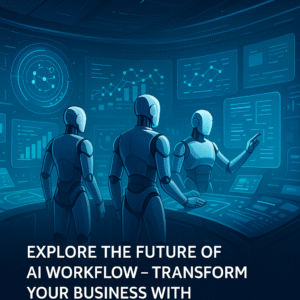Scaling AI Teams: Why You Need an AI Agent Manager
As AI agents become more autonomous, scalable, and specialized, businesses are evolving from using AI to managing AI. In 2025, AI agents are not just tools—they are digital team members that require coordination, oversight, and optimization. That’s where the AI Agent Manager comes in.
Just as humans need managers to operate efficiently as teams, AI agents require a managerial layer to assign goals, monitor performance, manage collaboration, and improve over time. This new role—part strategist, part orchestrator, part AI architect—is quickly becoming critical to any AI-driven organization.
In this article, we explore why an AI Agent Manager is key to scaling intelligent systems using the MCP framework and tools like Claude AI, GPT-4.5, and AutoGPT.
1. The Rise of AI Agents: Software That Thinks, Acts & Learns
AI Agents have advanced from simple script executors to autonomous decision-makers. They now:
Interpret user intent and context
Decompose high-level goals into tasks
Communicate with APIs and external systems
Learn from performance feedback
Example: Instead of asking a tool to “send an email,” you tell an agent to “follow up with cold leads”—and it handles everything.
In large-scale deployments, teams of agents—content agents, support agents, analytic agents, scheduling agents—work together across departments. But without oversight, these agents can create redundancy, drift, or conflict.
2. Why You Need an AI Agent Manager
Just as human teams need leadership to avoid chaos, AI agents require coordination to reach peak efficiency.
Core Responsibilities of an AI Agent Manager:
| Role | Description |
|---|---|
| Orchestration | Assigns tasks to the right agent based on expertise, availability, and priority |
| Monitoring | Tracks agent performance, output quality, and goal alignment |
| Optimization | Tunes prompts, memory settings, workflows, and agent roles |
| Security & Ethics | Enforces access control and ethical constraints |
| Training & Onboarding | Integrates new agents and aligns them with business logic |
Without a managerial layer, even the best AI systems risk becoming fragmented and ineffective.
3. Workflow Automation Needs Oversight
Workflow tools like Zapier, Make.com, and AutoGPT enable task chaining and process automation. But complexity rises when:
Multiple agents operate simultaneously
Business rules evolve dynamically
Agents produce unpredictable or creative outputs
An AI Agent Manager ensures workflows remain:
Aligned with strategy
Consistent in tone and outcome
Scalable without bottlenecks
Think of this manager as the conductor of an AI orchestra—ensuring all instruments play in sync.
4. MCP Framework: Managing Multi-Agent Collaboration
The MCP (Multi-agent Collaborative Process) framework is the underlying architecture that enables agent teams to work together.
Key Features of MCP:
Defined agent roles (e.g., Writer Agent, Research Agent, QA Agent)
Shared memory for situational awareness
Communication protocols for request-response cycles
Dynamic task allocation based on current performance
However, even MCP systems require human-led management to:
Set KPIs
Adjust strategies
Detect agent drift
Resolve task conflicts
This is where the AI Agent Manager adds strategic intelligence to the system.
5. Claude AI, GPT-4.5 & AutoGPT: The Tools You Must Manage
Let’s break down how these AI tools fit into the ecosystem—and why they benefit from a managerial role.
Claude AI – Strategic Reasoning & Communication
Claude AI excels in:
Context retention
Ethical filtering
Nuanced communication
It makes a great Editor Agent, Insight Analyst, or Customer-Facing Agent, but needs:
Clear input-output expectations
Role boundaries to prevent overreach
Feedback loops to refine tone & accuracy
GPT-4.5 – Content & Code Generation
GPT-4.5 is a powerhouse in:
Drafting long-form text
Generating structured code
Rapid iteration of ideas
It’s often used as a Writer Agent, Coder Agent, or Prompt Engineer, and must be:
Given consistent prompt templates
Monitored for factual accuracy
Managed to ensure SEO and brand tone consistency
AutoGPT – Workflow Execution & Integration
AutoGPT is the execution layer—automating workflows via:
API calls
Plugin usage
Loop-based self-adjustment
It serves as the Operations Agent, requiring:
Strict success criteria
Fail-safe recovery logic
Regular tuning of its decision loops
Without a manager, AutoGPT can easily drift from the intended strategy.
6. Real-World Use Case: Managing a Fully Autonomous Content Team
Imagine running a blog with zero manual writing. Here’s how an AI Agent Manager makes it happen:
Agent Stack:
Claude AI: Research & outline generation
GPT-4.5: Draft writing + metadata
AutoGPT: Publishes to WordPress, shares to social
Analytics Agent: Tracks CTR, bounce, keyword rank
Manager Tasks:
Set publishing schedule and target keywords
Monitor agent output for tone/accuracy
Update workflows based on SEO trends
Train new GPT prompts for style consistency
Detect content overlap and fix via agent feedback
Result: 40+ SEO blog posts/month with 90% AI execution, 10% strategic oversight.
7. The Human-AI Partnership Model
An AI Agent Manager isn’t coding bots—they’re leading teams of intelligent agents. The role resembles that of:
Project Manager for AI teams
Product Owner for AI services
Prompt Architect for performance tuning
Workflow Strategist for automation scalability
In a well-run system, humans manage goals, and agents deliver outcomes.
8. Preparing Your Business to Adopt This Role
To become or hire an AI Agent Manager, focus on:
| Skill | Why It Matters |
|---|---|
| Prompt engineering | Design effective, reusable agent instructions |
| Workflow design | Build scalable processes for AutoGPT or Zapier |
| Tool integration | Connect Claude/GPT to existing systems |
| AI ethics & policy | Ensure outputs align with brand values |
| Performance analysis | Use metrics to improve agent efficiency |
This role will soon be as critical as your DevOps or Product Manager.
SEO Keywords to Target
Optimize your blog or job description with:
AI Agent Manager role
AI agent team orchestration
MCP framework coordination
Claude AI team integration
GPT-4.5 content workflows
AutoGPT SaaS automation
AI operations management
Final Thoughts: Leading the Future, Not Just Building It
The era of AI agents is here—but without leadership, they are just a collection of tools. With a skilled AI Agent Manager, they become a self-optimizing team—delivering scale, speed, and intelligence unmatched by traditional software.
If you’re serious about scaling AI in your business, you don’t just need AI—you need AI leadership.
Ready to build your first AI agent team?
👉 Explore MagicLight’s AI-Powered Workflows and discover how AI Agent Managers scale the future of work.

